Module 8 Choosing presents 重点归纳与解难探究(含答案)
文档属性
| 名称 | Module 8 Choosing presents 重点归纳与解难探究(含答案) |
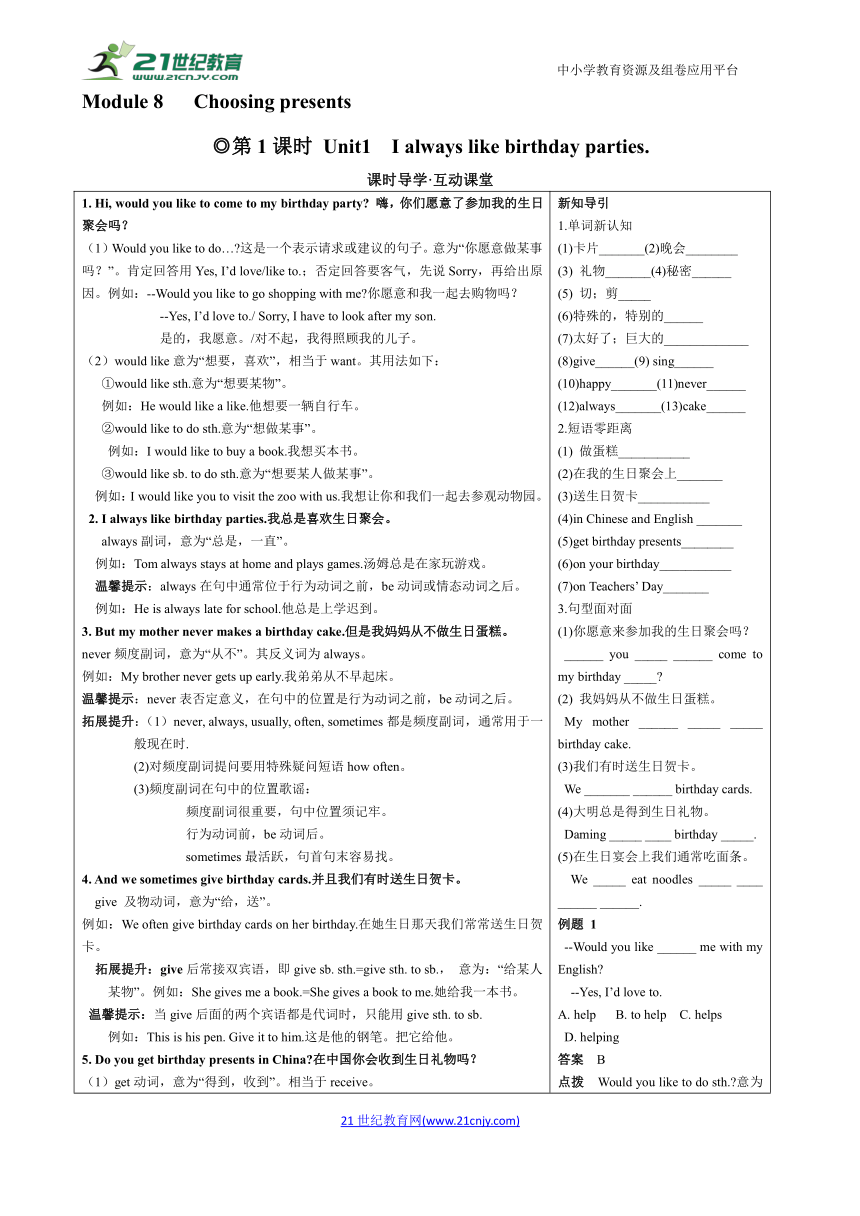
|
|
| 格式 | zip | ||
| 文件大小 | 1.4MB | ||
| 资源类型 | 试卷 | ||
| 版本资源 | 外研版 | ||
| 科目 | 英语 | ||
| 更新时间 | 2018-12-10 12:03:55 | ||
图片预览

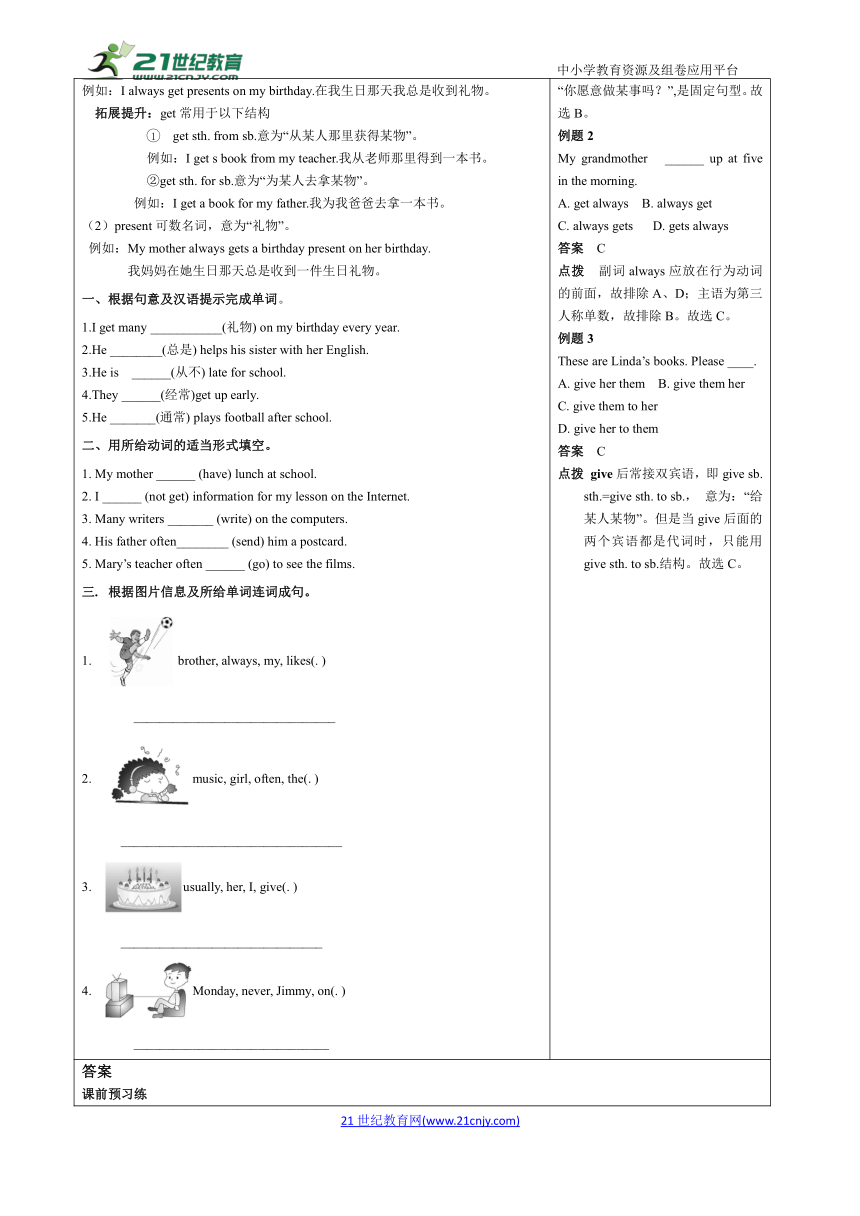
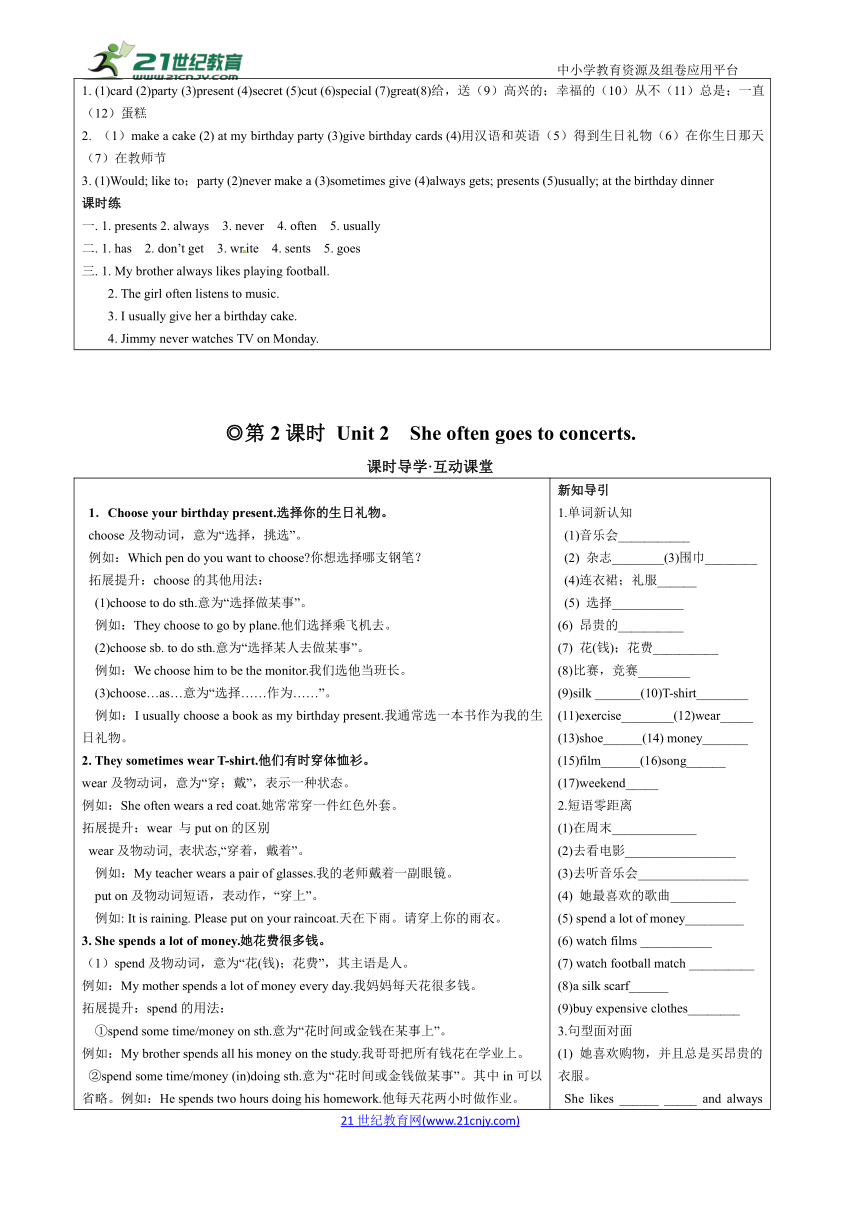
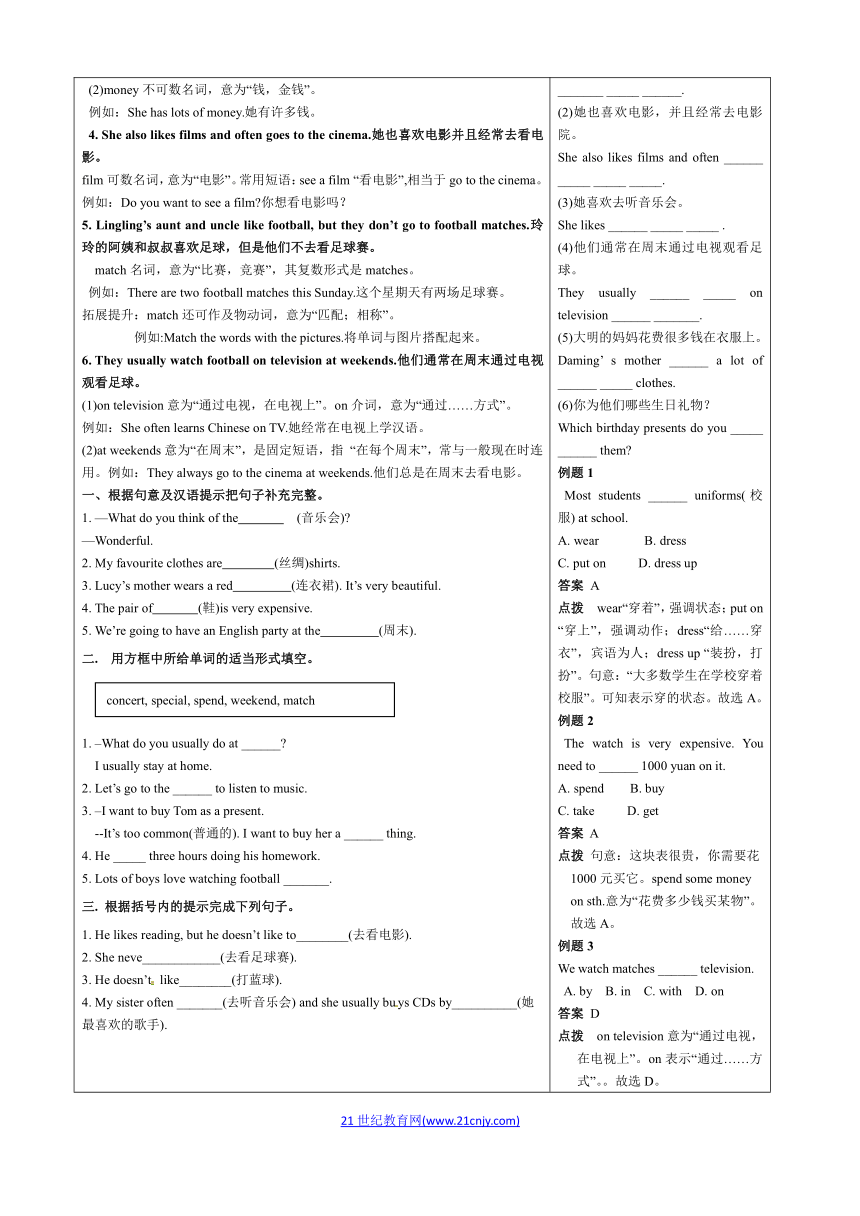
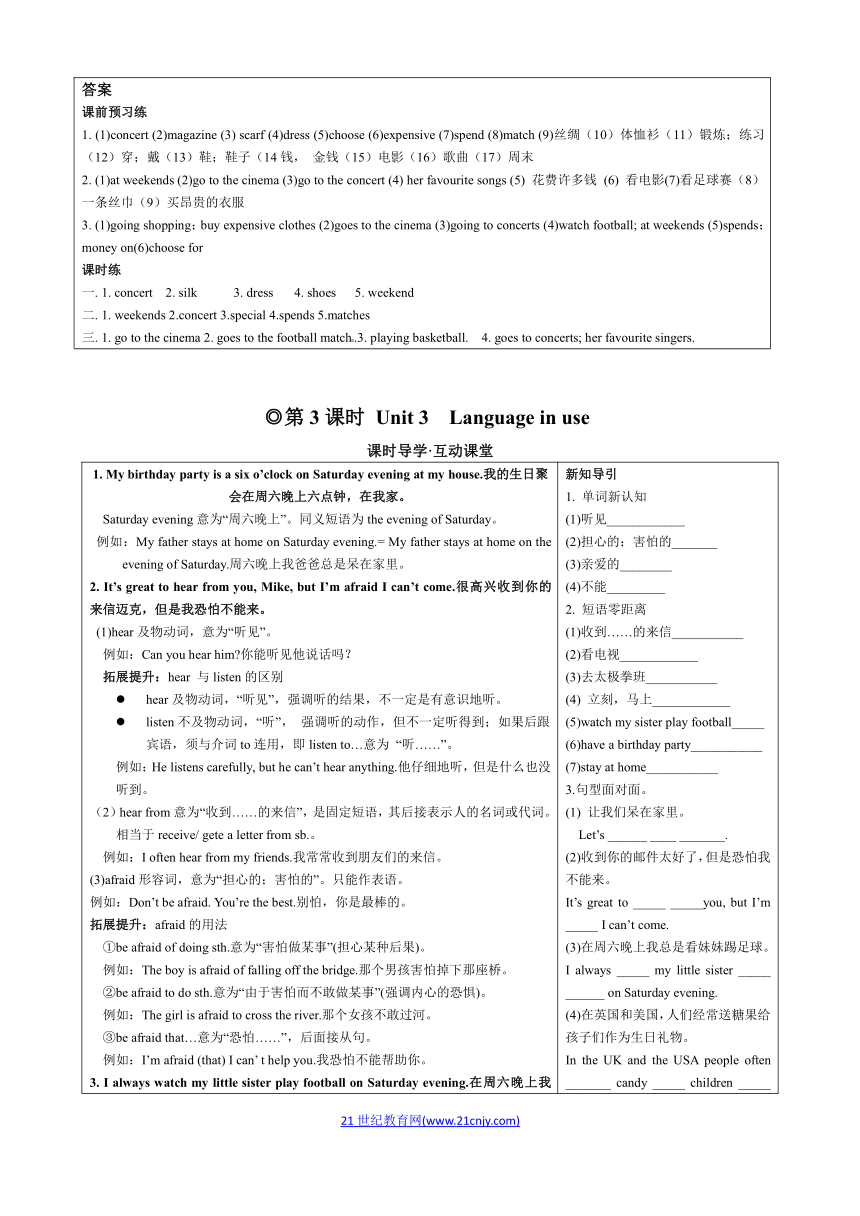
文档简介
中小学教育资源及组卷应用平台
Module 8 Choosing presents
◎第1课时 Unit1 I always like birthday parties.
课时导学·互动课堂
1. Hi, would you like to come to my birthday party? 嗨,你们愿意了参加我的生日聚会吗?(1)Would you like to do…?这是一个表示请求或建议的句子。意为“你愿意做某事吗?”。肯定回答用Yes, I’d love/like to.;否定回答要客气,先说Sorry,再给出原因。例如:--Would you like to go shopping with me?你愿意和我一起去购物吗? --Yes, I’d love to./ Sorry, I have to look after my son.是的,我愿意。/对不起,我得照顾我的儿子。(2)would like意为“想要,喜欢”,相当于want。其用法如下: ①would like sth.意为“想要某物”。例如:He would like a like.他想要一辆自行车。 ②would like to do sth.意为“想做某事”。例如:I would like to buy a book.我想买本书。 ③would like sb. to do sth.意为“想要某人做某事”。 例如:I would like you to visit the zoo with us.我想让你和我们一起去参观动物园。2. I always like birthday parties.我总是喜欢生日聚会。 always副词,意为“总是,一直”。例如:Tom always stays at home and plays games.汤姆总是在家玩游戏。温馨提示:always在句中通常位于行为动词之前,be动词或情态动词之后。例如:He is always late for school.他总是上学迟到。3. But my mother never makes a birthday cake.但是我妈妈从不做生日蛋糕。never频度副词,意为“从不”。其反义词为always。例如:My brother never gets up early.我弟弟从不早起床。温馨提示:never表否定意义,在句中的位置是行为动词之前,be动词之后。拓展提升:(1)never, always, usually, often, sometimes都是频度副词,通常用于一般现在时. (2)对频度副词提问要用特殊疑问短语how often。 (3)频度副词在句中的位置歌谣: 频度副词很重要,句中位置须记牢。 行为动词前,be动词后。 sometimes最活跃,句首句末容易找。4. And we sometimes give birthday cards.并且我们有时送生日贺卡。 give 及物动词,意为“给,送”。例如:We often give birthday cards on her birthday.在她生日那天我们常常送生日贺卡。拓展提升:give后常接双宾语,即give sb. sth.=give sth. to sb., 意为:“给某人某物”。例如:She gives me a book.=She gives a book to me.她给我一本书。 温馨提示:当give后面的两个宾语都是代词时,只能用give sth. to sb. 例如:This is his pen. Give it to him.这是他的钢笔。把它给他。5. Do you get birthday presents in China?在中国你会收到生日礼物吗?(1)get动词,意为“得到,收到”。相当于receive。例如:I always get presents on my birthday.在我生日那天我总是收到礼物。拓展提升:get常用于以下结构 get sth. from sb.意为“从某人那里获得某物”。例如:I get s book from my teacher.我从老师那里得到一本书。②get sth. for sb.意为“为某人去拿某物”。例如:I get a book for my father.我为我爸爸去拿一本书。(2)present可数名词,意为“礼物”。 例如:My mother always gets a birthday present on her birthday. 我妈妈在她生日那天总是收到一件生日礼物。一、根据句意及汉语提示完成单词。1.I get many ___________(礼物) on my birthday every year. 2.He ________(总是) helps his sister with her English. 3.He is ______(从不) late for school. 4.They ______(经常)get up early. 5.He _______(通常) plays football after school.二、用所给动词的适当形式填空。1. My mother ______ (have) lunch at school. 2. I ______ (not get) information for my lesson on the Internet. 3. Many writers _______ (write) on the computers. 4. His father often________ (send) him a postcard. 5. Mary’s teacher often ______ (go) to see the films. 三. 根据图片信息及所给单词连词成句。1. brother, always, my, likes(. ) _______________________________ 2. music, girl, often, the(. ) __________________________________ 3. usually, her, I, give(. ) _______________________________ 4. Monday, never, Jimmy, on(. ) ______________________________ 新知导引1.单词新认知 (1)卡片_______(2)晚会________ (3) 礼物_______(4)秘密______ (5) 切;剪_____ (6)特殊的,特别的______ (7)太好了;巨大的_____________ (8)give______(9) sing______ (10)happy_______(11)never______ (12)always_______(13)cake______ 2.短语零距离 (1) 做蛋糕___________ (2)在我的生日聚会上_______ (3)送生日贺卡___________ (4)in Chinese and English _______ (5)get birthday presents________ (6)on your birthday___________ (7)on Teachers’ Day_______ 3.句型面对面 (1)你愿意来参加我的生日聚会吗? ______ you _____ ______ come to my birthday _____? (2) 我妈妈从不做生日蛋糕。 My mother ______ _____ _____ birthday cake. (3)我们有时送生日贺卡。 We _______ ______ birthday cards. (4)大明总是得到生日礼物。 Daming _____ ____ birthday _____. (5)在生日宴会上我们通常吃面条。 We _____ eat noodles _____ ____ ______ ______.例题 1 --Would you like ______ me with my English? --Yes, I’d love to. A. help B. to help C. helps D. helping答案 B点拨 Would you like to do sth.?意为“你愿意做某事吗?”,是固定句型。故选B。例题2 My grandmother ______ up at five in the morning. A. get always B. always get C. always gets D. gets always答案 C点拨 副词always应放在行为动词的前面,故排除A、D;主语为第三人称单数,故排除B。故选C。例题3These are Linda’s books. Please ____. A. give her them B. give them her C. give them to her D. give her to them答案 C点拨 give后常接双宾语,即give sb. sth.=give sth. to sb., 意为:“给某人某物”。但是当give后面的两个宾语都是代词时,只能用give sth. to sb.结构。故选C。
答案课前预习练1. (1)card (2)party (3)present (4)secret (5)cut (6)special (7)great(8)给,送(9)高兴的;幸福的(10)从不(11)总是;一直(12)蛋糕 2. (1)make a cake (2) at my birthday party (3)give birthday cards (4)用汉语和英语(5)得到生日礼物(6)在你生日那天(7)在教师节 3. (1)Would; like to;party (2)never make a (3)sometimes give (4)always gets; presents (5)usually; at the birthday dinner课时练一. 1. presents 2. always 3. never 4. often 5. usually二. 1. has 2. don’t get 3. write 4. sents 5. goes三. 1. My brother always likes playing football. 2. The girl often listens to music. 3. I usually give her a birthday cake. 4. Jimmy never watches TV on Monday.
◎第2课时 Unit 2 She often goes to concerts.
课时导学·互动课堂
1.Choose your birthday present.选择你的生日礼物。choose及物动词,意为“选择,挑选”。例如:Which pen do you want to choose?你想选择哪支钢笔?拓展提升:choose的其他用法: (1)choose to do sth.意为“选择做某事”。例如:They choose to go by plane.他们选择乘飞机去。 (2)choose sb. to do sth.意为“选择某人去做某事”。例如:We choose him to be the monitor.我们选他当班长。 (3)choose…as…意为“选择……作为……”。例如:I usually choose a book as my birthday present.我通常选一本书作为我的生日礼物。2. They sometimes wear T-shirt.他们有时穿体恤衫。wear及物动词,意为“穿;戴”,表示一种状态。例如:She often wears a red coat.她常常穿一件红色外套。拓展提升:wear 与put on的区别 wear及物动词, 表状态,“穿着,戴着”。例如:My teacher wears a pair of glasses.我的老师戴着一副眼镜。 put on及物动词短语,表动作,“穿上”。例如: It is raining. Please put on your raincoat.天在下雨。请穿上你的雨衣。3. She spends a lot of money.她花费很多钱。(1)spend及物动词,意为“花(钱);花费”,其主语是人。例如:My mother spends a lot of money every day.我妈妈每天花很多钱。拓展提升:spend的用法:①spend some time/money on sth.意为“花时间或金钱在某事上”。例如:My brother spends all his money on the study.我哥哥把所有钱花在学业上。②spend some time/money (in)doing sth.意为“花时间或金钱做某事”。其中in可以省略。例如:He spends two hours doing his homework.他每天花两小时做作业。 (2)money不可数名词,意为“钱,金钱”。例如:She has lots of money.她有许多钱。 4. She also likes films and often goes to the cinema.她也喜欢电影并且经常去看电影。film可数名词,意为“电影”。常用短语:see a film “看电影”,相当于go to the cinema。例如:Do you want to see a film?你想看电影吗?5. Lingling’s aunt and uncle like football, but they don’t go to football matches.玲玲的阿姨和叔叔喜欢足球,但是他们不去看足球赛。 match名词,意为“比赛,竞赛”,其复数形式是matches。例如:There are two football matches this Sunday.这个星期天有两场足球赛。拓展提升:match还可作及物动词,意为“匹配;相称”。例如:Match the words with the pictures.将单词与图片搭配起来。6. They usually watch football on television at weekends.他们通常在周末通过电视观看足球。(1)on television意为“通过电视,在电视上”。on介词,意为“通过……方式”。例如:She often learns Chinese on TV.她经常在电视上学汉语。 (2)at weekends意为“在周末”,是固定短语,指 “在每个周末”,常与一般现在时连用。例如:They always go to the cinema at weekends.他们总是在周末去看电影。一、根据句意及汉语提示把句子补充完整。1. —What do you think of the (音乐会)? —Wonderful. 2. My favourite clothes are (丝绸)shirts. 3. Lucy’s mother wears a red (连衣裙). It’s very beautiful. 4. The pair of (鞋)is very expensive. 5. We’re going to have an English party at the (周末). 二. 用方框中所给单词的适当形式填空。 1. –What do you usually do at ______? I usually stay at home. 2. Let’s go to the ______ to listen to music. 3. –I want to buy Tom as a present. --It’s too common(普通的). I want to buy her a ______ thing. 4. He _____ three hours doing his homework. 5. Lots of boys love watching football _______.三. 根据括号内的提示完成下列句子。1. He likes reading, but he doesn’t like to________(去看电影). 2. She neve____________(去看足球赛). 3. He doesn’t like________(打蓝球). 4. My sister often _______(去听音乐会) and she usually buys CDs by__________(她最喜欢的歌手). 新知导引1.单词新认知 (1)音乐会___________ (2) 杂志________(3)围巾________ (4)连衣裙;礼服______ (5) 选择___________ (6) 昂贵的__________ (7) 花(钱);花费__________ (8)比赛,竞赛________ (9)silk _______(10)T-shirt________ (11)exercise________(12)wear_____ (13)shoe______(14) money_______ (15)film______(16)song______ (17)weekend_____ 2.短语零距离 (1)在周末_____________ (2)去看电影_________________ (3)去听音乐会_________________ (4) 她最喜欢的歌曲__________ (5) spend a lot of money_________ (6) watch films ___________ (7) watch football match __________ (8)a silk scarf______ (9)buy expensive clothes________ 3.句型面对面 (1) 她喜欢购物,并且总是买昂贵的衣服。 She likes ______ _____ and always _______ _____ ______. (2)她也喜欢电影,并且经常去电影院。 She also likes films and often ______ _____ _____ _____. (3)她喜欢去听音乐会。 She likes ______ _____ _____ . (4)他们通常在周末通过电视观看足球。 They usually ______ _____ on television ______ _______. (5)大明的妈妈花费很多钱在衣服上。 Daming’ s mother ______ a lot of ______ _____ clothes. (6)你为他们哪些生日礼物? Which birthday presents do you _____ ______ them?例题1 Most students ______ uniforms(校服) at school. A. wear B. dress C. put on D. dress up 答案 A点拨 wear“穿着”,强调状态;put on “穿上”,强调动作;dress“给……穿衣”,宾语为人;dress up “装扮,打扮”。句意:“大多数学生在学校穿着校服”。可知表示穿的状态。故选A。例题2 The watch is very expensive. You need to ______ 1000 yuan on it. A. spend B. buy C. take D. get答案 A点拨 句意:这块表很贵,你需要花1000元买它。spend some money on sth.意为“花费多少钱买某物”。故选A。 例题3 We watch matches ______ television. A. by B. in C. with D. on答案 D点拨 on television意为“通过电视,在电视上”。on表示“通过……方式”。。故选D。
答案课前预习练1. (1)concert (2)magazine (3) scarf (4)dress (5)choose (6)expensive (7)spend (8)match (9)丝绸(10)体恤衫(11)锻炼;练习(12)穿;戴(13)鞋;鞋子(14钱, 金钱(15)电影(16)歌曲(17)周末 2. (1)at weekends (2)go to the cinema (3)go to the concert (4) her favourite songs (5) 花费许多钱 (6) 看电影(7)看足球赛(8)一条丝巾(9)买昂贵的衣服 3. (1)going shopping;buy expensive clothes (2)goes to the cinema (3)going to concerts (4)watch football; at weekends (5)spends; money on(6)choose for课时练一. 1. concert 2. silk 3. dress 4. shoes 5. weekend二. 1. weekends 2.concert 3.special 4.spends 5.matches三. 1. go to the cinema 2. goes to the football match.3. playing basketball. 4. goes to concerts; her favourite singers.
◎第3课时 Unit 3 Language in use
课时导学·互动课堂
1. My birthday party is a six o’clock on Saturday evening at my house.我的生日聚会在周六晚上六点钟,在我家。 Saturday evening意为“周六晚上”。同义短语为the evening of Saturday。例如:My father stays at home on Saturday evening.= My father stays at home on the evening of Saturday.周六晚上我爸爸总是呆在家里。2. It’s great to hear from you, Mike, but I’m afraid I can’t come.很高兴收到你的来信迈克,但是我恐怕不能来。 (1)hear及物动词,意为“听见”。例如:Can you hear him?你能听见他说话吗?拓展提升:hear 与listen的区别 hear及物动词,“听见”,强调听的结果,不一定是有意识地听。 listen不及物动词,“听”, 强调听的动作,但不一定听得到;如果后跟宾语,须与介词to连用,即listen to…意为 “听……”。例如:He listens carefully, but he can’t hear anything.他仔细地听,但是什么也没听到。(2)hear from意为“收到……的来信”,是固定短语,其后接表示人的名词或代词。相当于receive/ gete a letter from sb.。 例如:I often hear from my friends.我常常收到朋友们的来信。 (3)afraid形容词,意为“担心的;害怕的”。只能作表语。例如:Don’t be afraid. You’re the best.别怕,你是最棒的。拓展提升:afraid的用法 ①be afraid of doing sth.意为“害怕做某事”(担心某种后果)。 例如:The boy is afraid of falling off the bridge.那个男孩害怕掉下那座桥。②be afraid to do sth.意为“由于害怕而不敢做某事”(强调内心的恐惧)。 例如:The girl is afraid to cross the river.那个女孩不敢过河。③be afraid that…意为“恐怕……”,后面接从句。 例如:I’m afraid (that) I can’ t help you.我恐怕不能帮助你。3. I always watch my little sister play football on Saturday evening.在周六晚上我总是看我的小妹妹踢足球。watch sb. do sth.意为“观看某人做某事”,侧重做某事的整个过程。例如:Do you often watch him play basketball?你常常看他打篮球吗?拓展提升:watch sb. doing sth.意为“观看某人正在做某事”,强调动作正在进行。 例如:I am watching my mother making a birthday cake.我正在观看我妈妈制作生日蛋糕。4. In the UK and the USA, people often give candy to children as birthday presents.在英国和美国,人们经常将糖果作为生日礼物送给孩子们。as介词,意为“作为”。例如:She speaks English as a second language.她把英语作为第二语言来讲。一. 根据句意和首字母提示完成单词。1. He always gets to school early, and he is n________ late. 2. Do you go shopping at w______? 3. I’m a______ I can’t come to your birthday party. 4. My English teacher is singing an English s_______. 5. I always h_____ from my mother on my birthday. 二、根据汉语提示用适当的短语或句式完成句子。1. My father sometimes ________ (看电视) when she doesn’t work. 2. ________ (恐怕) that I can’t come to your birthday party tomorrow. 3. Xue Min, what do you usually do _______ (在周末)? 4. I’m happy to ________ (收到……来信) my friends. 5. It’s five o’clock now. I have to go ________ (立刻). 三. 根据图片信息及所给关键词汇,补全下列句子。1. (?http:?/??/?www.21cnjy.com?) usually, on Sunday He _________________________________. 2. (?http:?/??/?www.21cnjy.com?) always, at home My brother _________________________________. 3. (?http:?/??/?www.21cnjy.com?) often, in the room They _________________________________ . 4. (?http:?/??/?www.21cnjy.com?) never, at 6:00 o’clock The child _________________________________ . 新知导引1. 单词新认知 (1)听见____________ (2)担心的;害怕的_______ (3)亲爱的________ (4)不能_________ 2. 短语零距离 (1)收到……的来信___________ (2)看电视____________ (3)去太极拳班___________ (4) 立刻,马上____________ (5)watch my sister play football_____ (6)have a birthday party___________ (7)stay at home___________ 3.句型面对面。 (1) 让我们呆在家里。 Let’s ______ ____ _______. (2)收到你的邮件太好了,但是恐怕我不能来。 It’s great to _____ _____you, but I’m _____ I can’t come. (3)在周六晚上我总是看妹妹踢足球。 I always _____ my little sister _____ ______ on Saturday evening. (4)在英国和美国,人们经常送糖果给孩子们作为生日礼物。 In the UK and the USA people often _______ candy _____ children _____ birthday presents. (5)你总是举办一个生日聚会吗? Do you always _____ _____ _____ ______?例题1 I often write ______ my brother, but he never hears ______ me. A. to; to B. for; to C. from; to D. to; from答案 D点拨 write to sb.意为“给某人写信”; hear from sb.意为“收到某人的来信”。故选A。例题2 --Would you like to play basketball with us this afternoon? --_______. I have to study for tomorrow’s teat. A. I’d love to B. I’m afraid not C. Sounds good D. No problem答案 B点拨 句意“今天下午你愿意和我们一起打篮球吗?”,由答语后句“我必须准备明天的考试”可知此处为否定回答。故选B项“恐怕不能”正确。例题3 In America people often give flowers ______ birthday presents. A. like B. as C. at D. in答案 B点拨 句意“在美国人们经常送花作为生日礼物”。 as介词,意为“作为”。故选B。
答案课前预习练1.(1)hear (2)afraid (3)dear (4)can’t/cannot 2. (1)hear from (2)watch TV (3)go to a taijiquan class (4)at once (5)看我妹妹踢足球(6)举行生日晚会(7)呆在家里 3. (1)stay at home (2)hear from ; afraid (3)watch; play football (4)give; to; as (5)have a birthday party课时练一.1.never 2. weekends 3.afraid 4.song 5.hear二. 1. watches TV (?http:?/??/?www.21cnjy.com?)2. I’m afraid 3. at weekends 4. hear from 5. at once 三. 1. usually pl (?http:?/??/?www.21cnjy.com?)ays basketball on Sunday 2. always read books at home 3. often sing in the room 4. never gets up at 6:00 o’clock
模块专题突破
专题归纳·语法透析
一般现在时的频度副词1. 定义 用来表示某一动作发生的频率或某一状态出现的频率,即在一定时间内动作重复发生或状态重复出现的次数。常见的频度副词有:always。Sometimes,usually,often,seldom,never等,它们表示的频率不同,按频率大小排列:always(一直)﹥usually(通常)﹥often(经常)﹥sometimes(有时) ﹥seldom(很少)﹥never(从不)。 例如:(1)He_______ work hard at English.他总是努力学习英语。 (2) My brother ______ goes to school at six.我弟弟通常六点 去上学。 (3)My friends _____ write to me.我朋友经常给我写信。 (4)He doesn’t like music. So he ______ goes to the concert.他不喜欢音乐。因此他从不去听音乐会。 2.在句中的位置在be动词之后。 例如:(5)My father _______ _______ very busy.我爸爸有时很忙。在助动词或情态动词之后。例如:(6)I _____ ______ remember my teacher.我总能记住我的老师。在行为动词之前。例如;(7)They _____ _____ to the concert.他们经常去听音乐。温馨提示:sometime可放在句首、句中或句末。 3. 在句中的用法 often, always, usually等通常和一般现在时连用,表示现在经常或反复发生的动作。 例如:(8)It ______ ______ here in April.这儿四月份经常下雨。 (9)He _____ ______ _____TVin the evening.他不总在晚上看电视。温馨提示:对这些频度副词提问时,用how often。 例如:I never play computer games.我从不玩电脑游戏。 (10)_____ _____ ___ you play computer games?你多久玩一次电脑游戏? 一、用所给动词的适当形式填空。1. My mother often ________ (read) books after work. 2. The young man ________ (ride) a horse every day. 3. His sister always ________ (wash) clothes on Saturday. 4. Li Kai ________ (have) a nice bike. 5. Her father never ________ (go) to work late. 二、将括号内的副词放到句中的适当位置。1.I go to the cinema.(often) _____________________________ 2.He plays games on Saturday.(usually) __________________________ 3. She gets up at 7:00am.(always) ___________________________ 4.They eat chocolate at home.(never) ____________________________ 5.She is very busy.(sometimes) ___________________________ 6.I will forget this lesson.( never) ____________________________三、根据汉语意思完成句子。1. 太阳总是从东方升起。 The sun rises in the east. 2. 我弟弟从不努力学习。 Mybrother studies hard. 3. 吉姆通常十二点睡觉。 Jim goes to bed at 12. 4. 有时我们去图书馆,有时我们去散步。 we go to the library and we ________ go for a walk. 5. 我以前从来没有见过这样的人。 I have met such a man before.
专题归纳 .语法透析
(1)always (2)usually (3)often(4)never (5)is sometimes (6)can always (7) often go (8)often rain (9)doesn’t always watch (10)How often do
语法练习
一、1. reads 2. rides 3. washes 4. has 5. goes
二、1. I often go to the cinema.
2.He usually plays games on Saturday.
3. She always gets up at 7:00am.
4.They never eat chocolate at home.
5.She is sometimes very busy.
6.I will never forget this lesson.
三、1. always 2. never 3. usually 4. Sometimes;sometimes 5. never
专题讲座·聚焦写作
写作素材
1. make a big meal做大餐
2. get sth. from sb.从某人那里获得某物
3. give sb. sth.=give sth. to sb.,给某人某物
4.a box of… 一盒……
5. a pair of… 一双……
6. sing the song唱歌
7. make sth. for sb. 为某人制作某物
典型例题
根据表格中的内容提示,谈谈“你”的生日情况,可适当发挥。不少于50词。
father some books
mother make a big meal
aunt make a cake
uncle a pair of trainers
friends different presents
_____________________________________________________________________
_____________________________________________________________________
_____________________________________________________________________
____________________________________________________________________
范文 Today is the 15th of March. It’s my birthday. I (1)get a lot of p presents from my friends and family. They are in nice boxes. My father (2) gives me a yellow box and there is some books in it. Because I like reading. My mother (3)makes a big meal for me. My aunt makes a cake for me. My uncle gives me (4)a pair of trainers, Jack, one of my friends, gives me a big box of chocolate. I like them very much. ? ?Now, my friends are singing the song “Happy Birthday to you” to me. 点评 (1) get sth. from sb.意为“从某人那里获得某物”。 (2)give后常接双宾语,即give sb. sth.= give sth. to sb., 意为“给某人某物”。 (3) make sth. for sb.意为“为某人制作某物”。 (4)a pair of意为“一双……”。后跟名词复数。
练习
假如你的好朋友Helen这个周末要举行生日party, 你向大家描述一下Helen, 方便大家选择礼物。
姓名 Helen
年龄 14
最喜欢的衣物 jeans, T-shirts, trainers
爱好 listen to music, go to concerts
不喜欢 football
要求: 1. 不要逐字翻译;
2. 不少于50个词。
____________________________________________________________________________________________________________________________________________________________________________________________________________________________________________________________________________________________________________________________________________________________________________________________________________________________________________
练习
One possible version:
I have a good friend. Her name is Helen. She is fourteen years old this year. She often wears jeans and T-shirts and she usually wears trainers. She often listens to music. She likes music. She usually goes to concerts and buys CDs by her favourite singers. But she doesn’t like football. She never watches football matches.
concert, special, spend, weekend, match
HYPERLINK "http://21世纪教育网(www.21cnjy.com)
" 21世纪教育网(www.21cnjy.com)
Module 8 Choosing presents
◎第1课时 Unit1 I always like birthday parties.
课时导学·互动课堂
1. Hi, would you like to come to my birthday party? 嗨,你们愿意了参加我的生日聚会吗?(1)Would you like to do…?这是一个表示请求或建议的句子。意为“你愿意做某事吗?”。肯定回答用Yes, I’d love/like to.;否定回答要客气,先说Sorry,再给出原因。例如:--Would you like to go shopping with me?你愿意和我一起去购物吗? --Yes, I’d love to./ Sorry, I have to look after my son.是的,我愿意。/对不起,我得照顾我的儿子。(2)would like意为“想要,喜欢”,相当于want。其用法如下: ①would like sth.意为“想要某物”。例如:He would like a like.他想要一辆自行车。 ②would like to do sth.意为“想做某事”。例如:I would like to buy a book.我想买本书。 ③would like sb. to do sth.意为“想要某人做某事”。 例如:I would like you to visit the zoo with us.我想让你和我们一起去参观动物园。2. I always like birthday parties.我总是喜欢生日聚会。 always副词,意为“总是,一直”。例如:Tom always stays at home and plays games.汤姆总是在家玩游戏。温馨提示:always在句中通常位于行为动词之前,be动词或情态动词之后。例如:He is always late for school.他总是上学迟到。3. But my mother never makes a birthday cake.但是我妈妈从不做生日蛋糕。never频度副词,意为“从不”。其反义词为always。例如:My brother never gets up early.我弟弟从不早起床。温馨提示:never表否定意义,在句中的位置是行为动词之前,be动词之后。拓展提升:(1)never, always, usually, often, sometimes都是频度副词,通常用于一般现在时. (2)对频度副词提问要用特殊疑问短语how often。 (3)频度副词在句中的位置歌谣: 频度副词很重要,句中位置须记牢。 行为动词前,be动词后。 sometimes最活跃,句首句末容易找。4. And we sometimes give birthday cards.并且我们有时送生日贺卡。 give 及物动词,意为“给,送”。例如:We often give birthday cards on her birthday.在她生日那天我们常常送生日贺卡。拓展提升:give后常接双宾语,即give sb. sth.=give sth. to sb., 意为:“给某人某物”。例如:She gives me a book.=She gives a book to me.她给我一本书。 温馨提示:当give后面的两个宾语都是代词时,只能用give sth. to sb. 例如:This is his pen. Give it to him.这是他的钢笔。把它给他。5. Do you get birthday presents in China?在中国你会收到生日礼物吗?(1)get动词,意为“得到,收到”。相当于receive。例如:I always get presents on my birthday.在我生日那天我总是收到礼物。拓展提升:get常用于以下结构 get sth. from sb.意为“从某人那里获得某物”。例如:I get s book from my teacher.我从老师那里得到一本书。②get sth. for sb.意为“为某人去拿某物”。例如:I get a book for my father.我为我爸爸去拿一本书。(2)present可数名词,意为“礼物”。 例如:My mother always gets a birthday present on her birthday. 我妈妈在她生日那天总是收到一件生日礼物。一、根据句意及汉语提示完成单词。1.I get many ___________(礼物) on my birthday every year. 2.He ________(总是) helps his sister with her English. 3.He is ______(从不) late for school. 4.They ______(经常)get up early. 5.He _______(通常) plays football after school.二、用所给动词的适当形式填空。1. My mother ______ (have) lunch at school. 2. I ______ (not get) information for my lesson on the Internet. 3. Many writers _______ (write) on the computers. 4. His father often________ (send) him a postcard. 5. Mary’s teacher often ______ (go) to see the films. 三. 根据图片信息及所给单词连词成句。1. brother, always, my, likes(. ) _______________________________ 2. music, girl, often, the(. ) __________________________________ 3. usually, her, I, give(. ) _______________________________ 4. Monday, never, Jimmy, on(. ) ______________________________ 新知导引1.单词新认知 (1)卡片_______(2)晚会________ (3) 礼物_______(4)秘密______ (5) 切;剪_____ (6)特殊的,特别的______ (7)太好了;巨大的_____________ (8)give______(9) sing______ (10)happy_______(11)never______ (12)always_______(13)cake______ 2.短语零距离 (1) 做蛋糕___________ (2)在我的生日聚会上_______ (3)送生日贺卡___________ (4)in Chinese and English _______ (5)get birthday presents________ (6)on your birthday___________ (7)on Teachers’ Day_______ 3.句型面对面 (1)你愿意来参加我的生日聚会吗? ______ you _____ ______ come to my birthday _____? (2) 我妈妈从不做生日蛋糕。 My mother ______ _____ _____ birthday cake. (3)我们有时送生日贺卡。 We _______ ______ birthday cards. (4)大明总是得到生日礼物。 Daming _____ ____ birthday _____. (5)在生日宴会上我们通常吃面条。 We _____ eat noodles _____ ____ ______ ______.例题 1 --Would you like ______ me with my English? --Yes, I’d love to. A. help B. to help C. helps D. helping答案 B点拨 Would you like to do sth.?意为“你愿意做某事吗?”,是固定句型。故选B。例题2 My grandmother ______ up at five in the morning. A. get always B. always get C. always gets D. gets always答案 C点拨 副词always应放在行为动词的前面,故排除A、D;主语为第三人称单数,故排除B。故选C。例题3These are Linda’s books. Please ____. A. give her them B. give them her C. give them to her D. give her to them答案 C点拨 give后常接双宾语,即give sb. sth.=give sth. to sb., 意为:“给某人某物”。但是当give后面的两个宾语都是代词时,只能用give sth. to sb.结构。故选C。
答案课前预习练1. (1)card (2)party (3)present (4)secret (5)cut (6)special (7)great(8)给,送(9)高兴的;幸福的(10)从不(11)总是;一直(12)蛋糕 2. (1)make a cake (2) at my birthday party (3)give birthday cards (4)用汉语和英语(5)得到生日礼物(6)在你生日那天(7)在教师节 3. (1)Would; like to;party (2)never make a (3)sometimes give (4)always gets; presents (5)usually; at the birthday dinner课时练一. 1. presents 2. always 3. never 4. often 5. usually二. 1. has 2. don’t get 3. write 4. sents 5. goes三. 1. My brother always likes playing football. 2. The girl often listens to music. 3. I usually give her a birthday cake. 4. Jimmy never watches TV on Monday.
◎第2课时 Unit 2 She often goes to concerts.
课时导学·互动课堂
1.Choose your birthday present.选择你的生日礼物。choose及物动词,意为“选择,挑选”。例如:Which pen do you want to choose?你想选择哪支钢笔?拓展提升:choose的其他用法: (1)choose to do sth.意为“选择做某事”。例如:They choose to go by plane.他们选择乘飞机去。 (2)choose sb. to do sth.意为“选择某人去做某事”。例如:We choose him to be the monitor.我们选他当班长。 (3)choose…as…意为“选择……作为……”。例如:I usually choose a book as my birthday present.我通常选一本书作为我的生日礼物。2. They sometimes wear T-shirt.他们有时穿体恤衫。wear及物动词,意为“穿;戴”,表示一种状态。例如:She often wears a red coat.她常常穿一件红色外套。拓展提升:wear 与put on的区别 wear及物动词, 表状态,“穿着,戴着”。例如:My teacher wears a pair of glasses.我的老师戴着一副眼镜。 put on及物动词短语,表动作,“穿上”。例如: It is raining. Please put on your raincoat.天在下雨。请穿上你的雨衣。3. She spends a lot of money.她花费很多钱。(1)spend及物动词,意为“花(钱);花费”,其主语是人。例如:My mother spends a lot of money every day.我妈妈每天花很多钱。拓展提升:spend的用法:①spend some time/money on sth.意为“花时间或金钱在某事上”。例如:My brother spends all his money on the study.我哥哥把所有钱花在学业上。②spend some time/money (in)doing sth.意为“花时间或金钱做某事”。其中in可以省略。例如:He spends two hours doing his homework.他每天花两小时做作业。 (2)money不可数名词,意为“钱,金钱”。例如:She has lots of money.她有许多钱。 4. She also likes films and often goes to the cinema.她也喜欢电影并且经常去看电影。film可数名词,意为“电影”。常用短语:see a film “看电影”,相当于go to the cinema。例如:Do you want to see a film?你想看电影吗?5. Lingling’s aunt and uncle like football, but they don’t go to football matches.玲玲的阿姨和叔叔喜欢足球,但是他们不去看足球赛。 match名词,意为“比赛,竞赛”,其复数形式是matches。例如:There are two football matches this Sunday.这个星期天有两场足球赛。拓展提升:match还可作及物动词,意为“匹配;相称”。例如:Match the words with the pictures.将单词与图片搭配起来。6. They usually watch football on television at weekends.他们通常在周末通过电视观看足球。(1)on television意为“通过电视,在电视上”。on介词,意为“通过……方式”。例如:She often learns Chinese on TV.她经常在电视上学汉语。 (2)at weekends意为“在周末”,是固定短语,指 “在每个周末”,常与一般现在时连用。例如:They always go to the cinema at weekends.他们总是在周末去看电影。一、根据句意及汉语提示把句子补充完整。1. —What do you think of the (音乐会)? —Wonderful. 2. My favourite clothes are (丝绸)shirts. 3. Lucy’s mother wears a red (连衣裙). It’s very beautiful. 4. The pair of (鞋)is very expensive. 5. We’re going to have an English party at the (周末). 二. 用方框中所给单词的适当形式填空。 1. –What do you usually do at ______? I usually stay at home. 2. Let’s go to the ______ to listen to music. 3. –I want to buy Tom as a present. --It’s too common(普通的). I want to buy her a ______ thing. 4. He _____ three hours doing his homework. 5. Lots of boys love watching football _______.三. 根据括号内的提示完成下列句子。1. He likes reading, but he doesn’t like to________(去看电影). 2. She neve____________(去看足球赛). 3. He doesn’t like________(打蓝球). 4. My sister often _______(去听音乐会) and she usually buys CDs by__________(她最喜欢的歌手). 新知导引1.单词新认知 (1)音乐会___________ (2) 杂志________(3)围巾________ (4)连衣裙;礼服______ (5) 选择___________ (6) 昂贵的__________ (7) 花(钱);花费__________ (8)比赛,竞赛________ (9)silk _______(10)T-shirt________ (11)exercise________(12)wear_____ (13)shoe______(14) money_______ (15)film______(16)song______ (17)weekend_____ 2.短语零距离 (1)在周末_____________ (2)去看电影_________________ (3)去听音乐会_________________ (4) 她最喜欢的歌曲__________ (5) spend a lot of money_________ (6) watch films ___________ (7) watch football match __________ (8)a silk scarf______ (9)buy expensive clothes________ 3.句型面对面 (1) 她喜欢购物,并且总是买昂贵的衣服。 She likes ______ _____ and always _______ _____ ______. (2)她也喜欢电影,并且经常去电影院。 She also likes films and often ______ _____ _____ _____. (3)她喜欢去听音乐会。 She likes ______ _____ _____ . (4)他们通常在周末通过电视观看足球。 They usually ______ _____ on television ______ _______. (5)大明的妈妈花费很多钱在衣服上。 Daming’ s mother ______ a lot of ______ _____ clothes. (6)你为他们哪些生日礼物? Which birthday presents do you _____ ______ them?例题1 Most students ______ uniforms(校服) at school. A. wear B. dress C. put on D. dress up 答案 A点拨 wear“穿着”,强调状态;put on “穿上”,强调动作;dress“给……穿衣”,宾语为人;dress up “装扮,打扮”。句意:“大多数学生在学校穿着校服”。可知表示穿的状态。故选A。例题2 The watch is very expensive. You need to ______ 1000 yuan on it. A. spend B. buy C. take D. get答案 A点拨 句意:这块表很贵,你需要花1000元买它。spend some money on sth.意为“花费多少钱买某物”。故选A。 例题3 We watch matches ______ television. A. by B. in C. with D. on答案 D点拨 on television意为“通过电视,在电视上”。on表示“通过……方式”。。故选D。
答案课前预习练1. (1)concert (2)magazine (3) scarf (4)dress (5)choose (6)expensive (7)spend (8)match (9)丝绸(10)体恤衫(11)锻炼;练习(12)穿;戴(13)鞋;鞋子(14钱, 金钱(15)电影(16)歌曲(17)周末 2. (1)at weekends (2)go to the cinema (3)go to the concert (4) her favourite songs (5) 花费许多钱 (6) 看电影(7)看足球赛(8)一条丝巾(9)买昂贵的衣服 3. (1)going shopping;buy expensive clothes (2)goes to the cinema (3)going to concerts (4)watch football; at weekends (5)spends; money on(6)choose for课时练一. 1. concert 2. silk 3. dress 4. shoes 5. weekend二. 1. weekends 2.concert 3.special 4.spends 5.matches三. 1. go to the cinema 2. goes to the football match.3. playing basketball. 4. goes to concerts; her favourite singers.
◎第3课时 Unit 3 Language in use
课时导学·互动课堂
1. My birthday party is a six o’clock on Saturday evening at my house.我的生日聚会在周六晚上六点钟,在我家。 Saturday evening意为“周六晚上”。同义短语为the evening of Saturday。例如:My father stays at home on Saturday evening.= My father stays at home on the evening of Saturday.周六晚上我爸爸总是呆在家里。2. It’s great to hear from you, Mike, but I’m afraid I can’t come.很高兴收到你的来信迈克,但是我恐怕不能来。 (1)hear及物动词,意为“听见”。例如:Can you hear him?你能听见他说话吗?拓展提升:hear 与listen的区别 hear及物动词,“听见”,强调听的结果,不一定是有意识地听。 listen不及物动词,“听”, 强调听的动作,但不一定听得到;如果后跟宾语,须与介词to连用,即listen to…意为 “听……”。例如:He listens carefully, but he can’t hear anything.他仔细地听,但是什么也没听到。(2)hear from意为“收到……的来信”,是固定短语,其后接表示人的名词或代词。相当于receive/ gete a letter from sb.。 例如:I often hear from my friends.我常常收到朋友们的来信。 (3)afraid形容词,意为“担心的;害怕的”。只能作表语。例如:Don’t be afraid. You’re the best.别怕,你是最棒的。拓展提升:afraid的用法 ①be afraid of doing sth.意为“害怕做某事”(担心某种后果)。 例如:The boy is afraid of falling off the bridge.那个男孩害怕掉下那座桥。②be afraid to do sth.意为“由于害怕而不敢做某事”(强调内心的恐惧)。 例如:The girl is afraid to cross the river.那个女孩不敢过河。③be afraid that…意为“恐怕……”,后面接从句。 例如:I’m afraid (that) I can’ t help you.我恐怕不能帮助你。3. I always watch my little sister play football on Saturday evening.在周六晚上我总是看我的小妹妹踢足球。watch sb. do sth.意为“观看某人做某事”,侧重做某事的整个过程。例如:Do you often watch him play basketball?你常常看他打篮球吗?拓展提升:watch sb. doing sth.意为“观看某人正在做某事”,强调动作正在进行。 例如:I am watching my mother making a birthday cake.我正在观看我妈妈制作生日蛋糕。4. In the UK and the USA, people often give candy to children as birthday presents.在英国和美国,人们经常将糖果作为生日礼物送给孩子们。as介词,意为“作为”。例如:She speaks English as a second language.她把英语作为第二语言来讲。一. 根据句意和首字母提示完成单词。1. He always gets to school early, and he is n________ late. 2. Do you go shopping at w______? 3. I’m a______ I can’t come to your birthday party. 4. My English teacher is singing an English s_______. 5. I always h_____ from my mother on my birthday. 二、根据汉语提示用适当的短语或句式完成句子。1. My father sometimes ________ (看电视) when she doesn’t work. 2. ________ (恐怕) that I can’t come to your birthday party tomorrow. 3. Xue Min, what do you usually do _______ (在周末)? 4. I’m happy to ________ (收到……来信) my friends. 5. It’s five o’clock now. I have to go ________ (立刻). 三. 根据图片信息及所给关键词汇,补全下列句子。1. (?http:?/??/?www.21cnjy.com?) usually, on Sunday He _________________________________. 2. (?http:?/??/?www.21cnjy.com?) always, at home My brother _________________________________. 3. (?http:?/??/?www.21cnjy.com?) often, in the room They _________________________________ . 4. (?http:?/??/?www.21cnjy.com?) never, at 6:00 o’clock The child _________________________________ . 新知导引1. 单词新认知 (1)听见____________ (2)担心的;害怕的_______ (3)亲爱的________ (4)不能_________ 2. 短语零距离 (1)收到……的来信___________ (2)看电视____________ (3)去太极拳班___________ (4) 立刻,马上____________ (5)watch my sister play football_____ (6)have a birthday party___________ (7)stay at home___________ 3.句型面对面。 (1) 让我们呆在家里。 Let’s ______ ____ _______. (2)收到你的邮件太好了,但是恐怕我不能来。 It’s great to _____ _____you, but I’m _____ I can’t come. (3)在周六晚上我总是看妹妹踢足球。 I always _____ my little sister _____ ______ on Saturday evening. (4)在英国和美国,人们经常送糖果给孩子们作为生日礼物。 In the UK and the USA people often _______ candy _____ children _____ birthday presents. (5)你总是举办一个生日聚会吗? Do you always _____ _____ _____ ______?例题1 I often write ______ my brother, but he never hears ______ me. A. to; to B. for; to C. from; to D. to; from答案 D点拨 write to sb.意为“给某人写信”; hear from sb.意为“收到某人的来信”。故选A。例题2 --Would you like to play basketball with us this afternoon? --_______. I have to study for tomorrow’s teat. A. I’d love to B. I’m afraid not C. Sounds good D. No problem答案 B点拨 句意“今天下午你愿意和我们一起打篮球吗?”,由答语后句“我必须准备明天的考试”可知此处为否定回答。故选B项“恐怕不能”正确。例题3 In America people often give flowers ______ birthday presents. A. like B. as C. at D. in答案 B点拨 句意“在美国人们经常送花作为生日礼物”。 as介词,意为“作为”。故选B。
答案课前预习练1.(1)hear (2)afraid (3)dear (4)can’t/cannot 2. (1)hear from (2)watch TV (3)go to a taijiquan class (4)at once (5)看我妹妹踢足球(6)举行生日晚会(7)呆在家里 3. (1)stay at home (2)hear from ; afraid (3)watch; play football (4)give; to; as (5)have a birthday party课时练一.1.never 2. weekends 3.afraid 4.song 5.hear二. 1. watches TV (?http:?/??/?www.21cnjy.com?)2. I’m afraid 3. at weekends 4. hear from 5. at once 三. 1. usually pl (?http:?/??/?www.21cnjy.com?)ays basketball on Sunday 2. always read books at home 3. often sing in the room 4. never gets up at 6:00 o’clock
模块专题突破
专题归纳·语法透析
一般现在时的频度副词1. 定义 用来表示某一动作发生的频率或某一状态出现的频率,即在一定时间内动作重复发生或状态重复出现的次数。常见的频度副词有:always。Sometimes,usually,often,seldom,never等,它们表示的频率不同,按频率大小排列:always(一直)﹥usually(通常)﹥often(经常)﹥sometimes(有时) ﹥seldom(很少)﹥never(从不)。 例如:(1)He_______ work hard at English.他总是努力学习英语。 (2) My brother ______ goes to school at six.我弟弟通常六点 去上学。 (3)My friends _____ write to me.我朋友经常给我写信。 (4)He doesn’t like music. So he ______ goes to the concert.他不喜欢音乐。因此他从不去听音乐会。 2.在句中的位置在be动词之后。 例如:(5)My father _______ _______ very busy.我爸爸有时很忙。在助动词或情态动词之后。例如:(6)I _____ ______ remember my teacher.我总能记住我的老师。在行为动词之前。例如;(7)They _____ _____ to the concert.他们经常去听音乐。温馨提示:sometime可放在句首、句中或句末。 3. 在句中的用法 often, always, usually等通常和一般现在时连用,表示现在经常或反复发生的动作。 例如:(8)It ______ ______ here in April.这儿四月份经常下雨。 (9)He _____ ______ _____TVin the evening.他不总在晚上看电视。温馨提示:对这些频度副词提问时,用how often。 例如:I never play computer games.我从不玩电脑游戏。 (10)_____ _____ ___ you play computer games?你多久玩一次电脑游戏? 一、用所给动词的适当形式填空。1. My mother often ________ (read) books after work. 2. The young man ________ (ride) a horse every day. 3. His sister always ________ (wash) clothes on Saturday. 4. Li Kai ________ (have) a nice bike. 5. Her father never ________ (go) to work late. 二、将括号内的副词放到句中的适当位置。1.I go to the cinema.(often) _____________________________ 2.He plays games on Saturday.(usually) __________________________ 3. She gets up at 7:00am.(always) ___________________________ 4.They eat chocolate at home.(never) ____________________________ 5.She is very busy.(sometimes) ___________________________ 6.I will forget this lesson.( never) ____________________________三、根据汉语意思完成句子。1. 太阳总是从东方升起。 The sun rises in the east. 2. 我弟弟从不努力学习。 Mybrother studies hard. 3. 吉姆通常十二点睡觉。 Jim goes to bed at 12. 4. 有时我们去图书馆,有时我们去散步。 we go to the library and we ________ go for a walk. 5. 我以前从来没有见过这样的人。 I have met such a man before.
专题归纳 .语法透析
(1)always (2)usually (3)often(4)never (5)is sometimes (6)can always (7) often go (8)often rain (9)doesn’t always watch (10)How often do
语法练习
一、1. reads 2. rides 3. washes 4. has 5. goes
二、1. I often go to the cinema.
2.He usually plays games on Saturday.
3. She always gets up at 7:00am.
4.They never eat chocolate at home.
5.She is sometimes very busy.
6.I will never forget this lesson.
三、1. always 2. never 3. usually 4. Sometimes;sometimes 5. never
专题讲座·聚焦写作
写作素材
1. make a big meal做大餐
2. get sth. from sb.从某人那里获得某物
3. give sb. sth.=give sth. to sb.,给某人某物
4.a box of… 一盒……
5. a pair of… 一双……
6. sing the song唱歌
7. make sth. for sb. 为某人制作某物
典型例题
根据表格中的内容提示,谈谈“你”的生日情况,可适当发挥。不少于50词。
father some books
mother make a big meal
aunt make a cake
uncle a pair of trainers
friends different presents
_____________________________________________________________________
_____________________________________________________________________
_____________________________________________________________________
____________________________________________________________________
范文 Today is the 15th of March. It’s my birthday. I (1)get a lot of p presents from my friends and family. They are in nice boxes. My father (2) gives me a yellow box and there is some books in it. Because I like reading. My mother (3)makes a big meal for me. My aunt makes a cake for me. My uncle gives me (4)a pair of trainers, Jack, one of my friends, gives me a big box of chocolate. I like them very much. ? ?Now, my friends are singing the song “Happy Birthday to you” to me. 点评 (1) get sth. from sb.意为“从某人那里获得某物”。 (2)give后常接双宾语,即give sb. sth.= give sth. to sb., 意为“给某人某物”。 (3) make sth. for sb.意为“为某人制作某物”。 (4)a pair of意为“一双……”。后跟名词复数。
练习
假如你的好朋友Helen这个周末要举行生日party, 你向大家描述一下Helen, 方便大家选择礼物。
姓名 Helen
年龄 14
最喜欢的衣物 jeans, T-shirts, trainers
爱好 listen to music, go to concerts
不喜欢 football
要求: 1. 不要逐字翻译;
2. 不少于50个词。
____________________________________________________________________________________________________________________________________________________________________________________________________________________________________________________________________________________________________________________________________________________________________________________________________________________________________________
练习
One possible version:
I have a good friend. Her name is Helen. She is fourteen years old this year. She often wears jeans and T-shirts and she usually wears trainers. She often listens to music. She likes music. She usually goes to concerts and buys CDs by her favourite singers. But she doesn’t like football. She never watches football matches.
concert, special, spend, weekend, match
HYPERLINK "http://21世纪教育网(www.21cnjy.com)
" 21世纪教育网(www.21cnjy.com)
同课章节目录
- Starte
- Module 1 My teacher and my friends
- Module 2 My English lesson
- Module 3 My English book
- Module 4 My everyday life
- Module 1 My classmates
- Unit 1 Nice to meet you.
- Unit 2 I'm Wang Lingling and I'm thirteen years ol
- Unit 3 Language in use.
- Module 2 My family
- Unit 1 Is this your mum?
- Unit 2 These are my parents.
- Unit 3 Language in use.
- Module 3 My school
- Unit 1 There are thirty students in my class.
- Unit 2 The library is on the left of the playgroun
- Unit 3 Language in use.
- Module 4 Healthy food
- Unit 1 We've got lots of apples.
- Unit 2 Is your food and drink healthy?
- Unit 3 Language in use.
- Module 5 My school day
- Unit 1 I love history.
- Unit 2 We start work at nine o'clock.
- Unit 3 Language in use.
- Revision module A
- Module 6 A trip to the zoo
- Unit 1 Does it eat meat?
- Unit 2 The tiger lives in Asia.
- Unit 3 Language in use.
- Module 7 Computers
- Unit 1 How do I write my homework on the computer?
- Unit 2 When do you use a computer?
- Unit 3 Language in use.
- Module 8 Choosing presents
- Unit 1 I always like birthday parties.
- Unit 2 She often goes to concerts.
- Unit 3 Language in use.
- Module 9 People and places
- Unit 1 We're enjoying the school trip a lot.
- Unit 2 They're waiting for buses or trains.
- Unit 3 Language in use.
- Module 10 Spring Festival
- Unit 1 Are you getting ready for Spring Festival?
- Unit 2 My mother's cleaning our houses and sweepin
- Unit 3 Language in use.
- Revision module B
